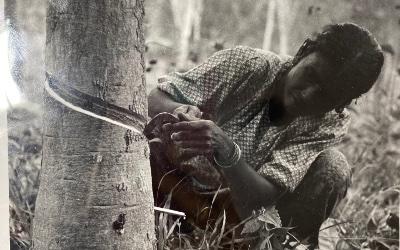OU receives £300k grant to explore legacies of colonialism in Malaysia

The Open University has recently secured almost £300,000 funding from the British Academy for a project that will explore coloniality and precarity engagements amongst urban-poor resilient Malaysian Indian women (EXCAPE-URMI). Dr Geetha Reddy and Malaysian colleagues Dr Nithiya Guna Saigaran, Enbah Nilah, and Rupa Subramaniam are undertaking this two-year exploratory project to understand how coloniality continues to impact descendants of indentured Indian labourers in Malaysia.
Explaining what this means, Dr Geetha Reddy, Lecturer in Psychology said, "Colonial powers such as Britain imposed imperialist values and beliefs across their empires while robbing Indigenous communities of their lands, cultures, languages, and wisdom. While many have gained some form of independence, like self-governance, the social order and everyday life in former colonies today is underpinned by coloniality – the legacy of colonialism – which established racial, political, gender and class hierarchies of control, favouring some groups and marginalising others. For the descendants of Indian indentured labourers this plays out in everyday racism and discrimination which deprives them of education, employment and good health."
The project seeks to understand and address these issues by looking at how much the colonial legacies left still affect the lives of urban-poor resilient Malaysian Indian women. In particular, the project applies a decolonial theorising of social issues to explore the aspects of their lives that are most influenced, how this can be disrupted, and how more sustainable approaches can be taken whilst addressing the causes and not just the resulting issues. The EXCAPE-URMI project forms part of a wider 10-year research vision that is supported by the University’s Open Societal Challenges programme.
This is a participatory action research project, meaning all those participating in the research are thought of as core researchers and will have input on the research agenda and methods utilised. The team consults and engages with the communities being explored by asking and responding to the women involved to deliver the changes that they want to see in their lives. As a result, this will lead to transformative action that enacts positive change in those communities and beyond.
Findings from the project are expected to inform public policy and future initiatives that seek to redress inequalities faced by urban-poor Malaysian Indian women. Dr Reddy added, “I started this work in 2013 to unravel all these layers. Many people I am engaging with, at all levels and locations, haven’t heard of colonial legacies before. I understood that colonial constructions of race in Malaysia and Singapore endure in the way we interact with one another today by speaking to 39 Malaysians and Singaporeans.
“We are working with various communities and groups to understand what are the ways that we can build solidarity across geographical locations and contexts to uplift each other globally. This project is just one piece of a much bigger puzzle that I hope will be picked up collectively. To me, success is enacting policy change, but more widely, it is about sharing this information to create a global shift in ways of thinking and acting. Ultimately, I would love to see people creating music, plays and other forms of art to communicate these issues and enact social change.”
Image: "British Official Photograph: Issued by the Central Office of information, London. Crown Copyright reserved."
Quarterly Review of Research
Read our Quarterly Review of Research to learn about our latest quality academic output.

Contact our news team
For all out of hours enquiries, please telephone +44 (0)7901 515891
Contact details